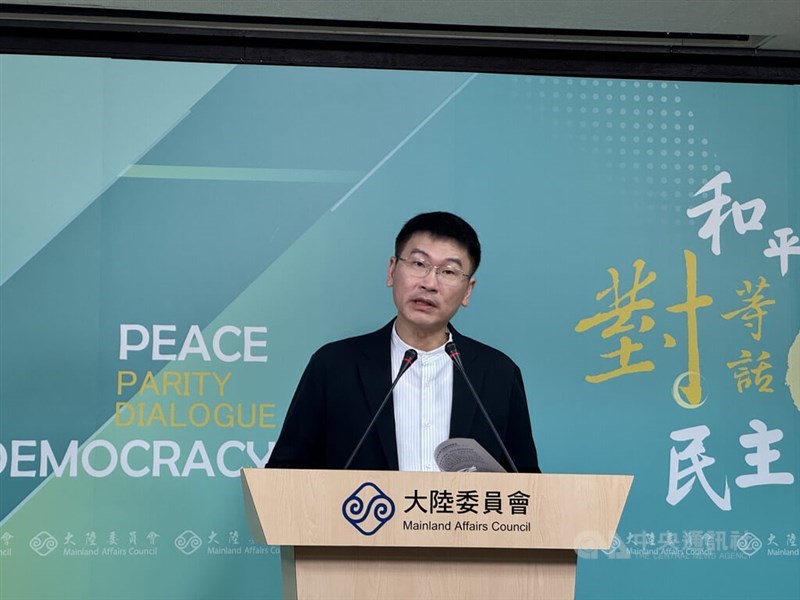MOFA official rejects 'One China' affidavit, unable to get Macao post visa

Taipei, Aug. 1 (CNA) A Ministry of Foreign Affairs (MOFA) official set to be posted to Taiwan's representative office in Macao was unable to obtain a visa from the Macao government after refusing to sign an affidavit recognizing Beijing's "One China" principle, the Mainland Affairs Council (MAC) said Thursday.
The previous MOFA official stationed in the Taipei Economic and Cultural Office (TECO) in Macao returned to Taiwan on July 23 after being posted there for over 10 years, said MAC deputy head and spokesperson Liang Wen-chieh (梁文傑) at a press conference.
However, another MOFA official set to fill the vacant post was unable to obtain a visa "as the Macao government continues to unilaterally impose a political condition for visa applications," he said.
The government of the Chinese special administrative region required the new appointment to sign an affidavit adhering to the "One China" principle that "our side cannot agree to," Liang said, adding that it resulted in the individual being unable to take up the post in Macao.
Since 2019, the Macao government has required Taiwan officials at TECO-Macao, which is administered by the MAC, to sign affidavits recognizing Beijing's "One China" principle in order to be issued with new visas.
Taiwanese staffers posted to Macao before the implementation of the measure, have been able to stay in the territory by extending their original visas.
From the Taiwan government's perspective, it was not feasible to force the recently returned MOFA official to remain in Macao, Liang said, urging the Macao government "not to impose unnecessary obstacles" to new appointment taking up the post.
If the Macao government continues to insist on such requirement for Taiwanese officials, the Taiwanese authorities "will prepare for the worst" Liang said, without specifying what actions would be taken. But he noted that they would undoubtedly impact civil exchanges between Taiwan and Macao and damage the city's international image.
Regarding the impact on Taiwanese living in or traveling to Macao after the return of the MOFA official, Liang said the official's past duties included assisting with matters related to passports, entry and exit certificates, and visas.
Since the position is now vacant, those services have to be handled through online appointments and remote monitoring, causing significant inconvenience, he said.
According to information provided by the MAC, TECO-Macao should be staffed by eight Taiwanese officials, from various government agencies, such as MOFA, the MAC, and the National Immigration Agency.
After the departure of the MOFA official, only two Taiwanese officials, both MAC staff members who have been posted in the Chinese city for seven to eight years remain, along with 14 local Macao employees.
Meanwhile, Liang announced the results of the MAC's latest survey, which indicated that 84.6 percent of Taiwanese disagree with China's issuance of a new set of guidelines targeting "diehard" advocates of Taiwan independence and the implementation of new national security regulations that allow the authorities to inspect personal belongings.
According to the survey, 85.1 percent of interviewees also disagreed with China Coast Guard's claim of "regular law enforcement patrols" in waters near the Taiwan-held Kinmen Islands.
The survey, commissioned by the MAC, was conducted by National Chengchi University's Election Study Center from July 26-30 through telephone interviews with adults aged 20 and above in Taiwan.
According to the MAC, 1,073 valid samples were collected, with a confidence level of 95 percent and a margin of error of plus or minus 2.99 percentage points.
- Society
Overseas visitor arrivals surpass 2023 numbers: Tourism Administration
11/13/2024 04:39 PM - Business
U.S. dollar closes higher on Taipei forex market
11/13/2024 04:18 PM - Politics
Taiwan defense chief mum on Ukraine missile gift, pending arms sales
11/13/2024 02:29 PM - Business
Taiwan shares close down 0.53%
11/13/2024 01:47 PM - Society
Tropical Storm Usagi strengthens to typhoon
11/13/2024 12:06 PM
